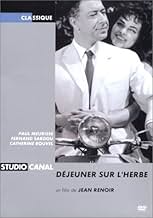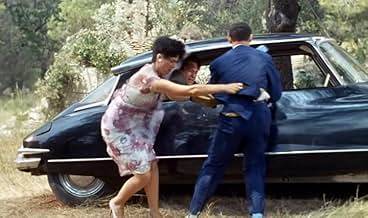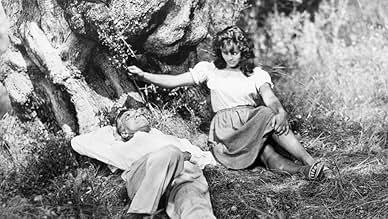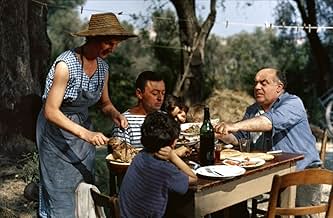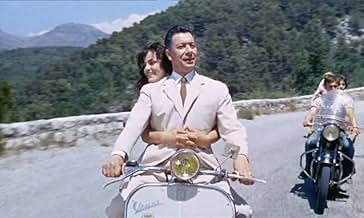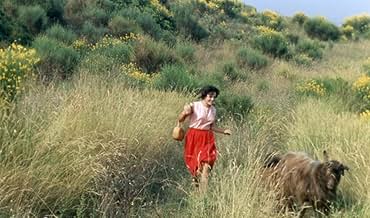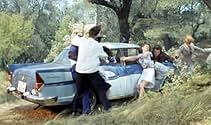Le déjeuner sur l'herbe
- 1959
- Tous publics
- 1h 31m
IMDb RATING
6.5/10
1.5K
YOUR RATING
Etienne Alexis, a scientist promoting artificial insemination for social betterment, hosts an aseptic picnic for his engagement to a German cousin. A windstorm brings him together with Nénet... Read allEtienne Alexis, a scientist promoting artificial insemination for social betterment, hosts an aseptic picnic for his engagement to a German cousin. A windstorm brings him together with Nénette, a farm lass who is unimpressed with men.Etienne Alexis, a scientist promoting artificial insemination for social betterment, hosts an aseptic picnic for his engagement to a German cousin. A windstorm brings him together with Nénette, a farm lass who is unimpressed with men.
Charles Blavette
- Gaspard
- (as Blavette)
Régine Blaess
- Claire
- (as Régine Blaes)
Jacques Dannoville
- Mr. Poignant
- (as Jacques Danoville)
- Director
- Writer
- All cast & crew
- Production, box office & more at IMDbPro
Featured reviews
10Aw-komon
The third part of Renoir's impressionist trilogy ("The River," and "French Cancan" are the others) is a gorgeously photographed panorama of the French countryside which serves as the background for a picnic thrown by a biologist who has perfected a method for 'artificial insemination,' and who furthermore, is about to run for "President of Europe!"
Catherine Rouvel plays Nennette, a beautiful country girl who has had bad luck with men but would very much like to have a baby. After hearing about the famous doctor's techniques she decides to go and volunteer for 'artificial insemination.' She ends up being employed by the doctor's staff and goes on the country picnic with them, during which the picnicers are subjected to 'mysterious occurrences and temptations' which are produced when a certain goat-shepherd plays his wooden flute! The famous biologist, very detached and committed to strict methods of reason, starts to discover the higher harmonies embedded in nature while he falls in love with the lovely Nennette, a union to which his political cronies are opposed.
The film is rich with fantastically beautiful images. The scene of Rouvel taking a skinny dip while the doctor casts quick diffident glances her way is one of the most poetic in all of cinema. Of special note also is the scene where all the picnicers ride on mopeds through the country lanes, which was the direct inspiration for the famous bicycling scene in Truffaut's "Jules and Jim."
Renoir takes what may at first seem like just a trivial comedy and turns it into an ultra-subtle, timeless and poetic meditation on the conflict between modern society and 'natural imperatives.' As always it is Renoir's deeply romantic (in the best sense of the word)and compassionate view of humanity which underlies everything and makes his criticisms so poignant.
Catherine Rouvel plays Nennette, a beautiful country girl who has had bad luck with men but would very much like to have a baby. After hearing about the famous doctor's techniques she decides to go and volunteer for 'artificial insemination.' She ends up being employed by the doctor's staff and goes on the country picnic with them, during which the picnicers are subjected to 'mysterious occurrences and temptations' which are produced when a certain goat-shepherd plays his wooden flute! The famous biologist, very detached and committed to strict methods of reason, starts to discover the higher harmonies embedded in nature while he falls in love with the lovely Nennette, a union to which his political cronies are opposed.
The film is rich with fantastically beautiful images. The scene of Rouvel taking a skinny dip while the doctor casts quick diffident glances her way is one of the most poetic in all of cinema. Of special note also is the scene where all the picnicers ride on mopeds through the country lanes, which was the direct inspiration for the famous bicycling scene in Truffaut's "Jules and Jim."
Renoir takes what may at first seem like just a trivial comedy and turns it into an ultra-subtle, timeless and poetic meditation on the conflict between modern society and 'natural imperatives.' As always it is Renoir's deeply romantic (in the best sense of the word)and compassionate view of humanity which underlies everything and makes his criticisms so poignant.
Seems to represent Renoir bringing his classic concerns into a modern format - the movie begins with a (slightly leaden) satire of modern media, and the plot relies heavily on artificial insemination, the politics of a modern Europe, the politics of image, and preeminently the relationship between science (here representing repression and fastidiousness and self-denial) and nature (here representing a rustic, lusty, idyllic, semi-slapstick integrity). That sounds a bit condescending, and indeed it s an old man's movie. But it's also a very good one, with superb choreography of the elements and many moments of bliss (the shot of the loosened-up professor beaming as he rides a motor scooter is priceless). Sadly, it s hard to get beyond the wretched quality of the Eastmancolor print - there s virtually no green left in it, just a sickly pink. A restored print would surely add to the movie s emotional lushness, perhaps revealing whole layers of additional subtlety in the design, and giving it a sharpened modernity. Even as it stands, a beguiling film.
Seeing this film enhanced my appreciation of life. It reminded me of Cyrano De Bergerac. A theme I enjoyed: love between rich and poor can indeed exist. And also, I also liked how beautifully love was depicted.
One's appreciation for human relations is bettered.
One's appreciation for human relations is bettered.
A satirical farce from Renoir on the bourgeoisie, (naturally), built around the subject of artificial insemination and sex but too broad to make a real impact, a kind of Carry On Picnicing. Paul Meurisse is the priggish scientist running for President of Europe who wants to make babies the arificial way but who comes under the spell of Nenette, (Catherine Rouvel), quite literally thanks to a flute-playing shepherd who can conjour up a wind-storm if need be. It looks great, (Renoir shot it in colour), and there's a nice score by Joseph Kosma but in the Renoir canon it's really only a divertissement . Still, even a Renoir divertissement counts for something and this one is undeniably 'charmant'.
An unusual intro sequence involves layering the diegetic world through an odd specularity utilizing newsreel interviews and binding characters to different milieux. There are a plethora of tongue-in-cheek juxtapositions of science and nature which reminds one of Makavejev's oeuvre (especially in the link being sexuality). Rare Renoirian soft focus accompanies one-shot closeups while the self-reflexivity leads to a near mocking of the famous Renoir stylistic system. Depth of field is arranged where characters continuously 'pop up' in the different planes. Groups are framed in long shots. Dejeuner sur L'Herbe is almost bizarre in its referencing to the French New Wave and the Tradition of Quality. FNW is treated as a horizon running perpendicular to the tight-rope Renoir traverses toward it while the ToQ is set up as a gorge below which has a perverted inversion in its reflection as it to position itself in the clouds like Gods. Renoir seems to make a journey of this film - a personal journey toward his favored colleagues but with the knowledge that his alignment is bound to his past. "Every film is a confession" is a Vuillermoz quote well addressed in this film. The pan flautist is a famous Renoir motif and appropriately placed in Dejeuner where Renoir as auteur becomes a force of nature - he becomes the milieu (and perhaps always was). The picnickers seem indifferent to the Pan character's supernatural powers revealing a cynicism that has popped up many times with Renoir. "In every man a satyr sleeps" is no revelation, but a warning about the internal and external truths which become convoluted and disparate through the individual's attempts to manage them. It has been noted that Dejeuner lacks in subtlety. I believe that it was the intention as the film text is simply overdetermined in its self-reflexivity that the specular nature of the film cannot be ignored. The Damascus reference troubles me, while the Hitler-orator allusions and scooter ride seem all too obvious as components of an autobiography. This film is important for understanding Renoir as an auteur.
Did you know
- TriviaAccording to film critic Jonas Mekas, Jean Renoir made this film with the money he got from the American release of La grande illusion.
- ConnectionsFeatured in Le bonheur (1965)
- How long is Picnic on the Grass?Powered by Alexa
Details
- Release date
- Country of origin
- Language
- Also known as
- Picnic on the Grass
- Filming locations
- Production company
- See more company credits at IMDbPro
- Runtime
- 1h 31m(91 min)
- Color
- Aspect ratio
- 1.66 : 1
Contribute to this page
Suggest an edit or add missing content

